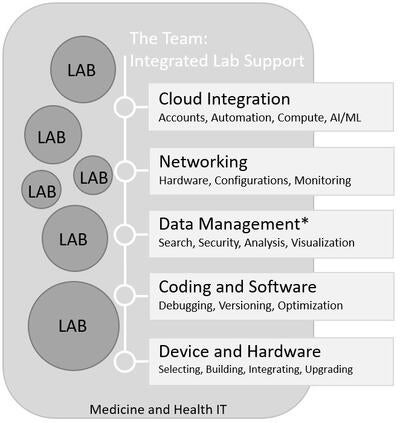We want to hear from you! Take the survey.
How do you use It’s Your Yale? How can it be improved? Answer for a chance to win Yale swag.
Exploring an IT support model for medical researchers
November 12, 2020
Research labs at the Yale School of Medicine (YSM) faced a challenge — they needed to consume complex integrated informatics and information technologies to become more efficient. Without proper IT support, it was likely that they would implement solutions that do not meet their needs—potentially wasting time and money. A model for supporting research labs at YSM was needed. As a key supporter of medical researchers at Yale, IT was positioned to assist them.
A support model was submitted to ITS leadership in the fall of 2019, and funding was approved for a 6-month pilot to test this new integrated lab support approach.
The Integrated Lab Support (ILS) model:

- A team of technology experts that work together to solve complex, interwoven technical problems
- A team that is small enough to be agile and responsive to a researcher’s immediate needs, but at the same time comprehensive enough to cover the spectrum of technologies that researchers will want to consume in their labs
- A team that allows researchers to utilize the most appropriate technologies in a responsible and robust way - allowing labs to focus energies on the science and not the technology
During the pilot this team of Yale IT support and YSM IT support staff engaged with 14 research labs across YSM and identified 37 specific lab needs that the ILS team responded to. These needs fell into 3 main categories—overcoming lab technical debt, improving existing lab processes, and new areas of lab innovation.
Overcoming technical debt was our top priority. We migrated lab infrastructure onto Yale IT systems such as Spinup, Storage @ Yale, and Teams while streamlining process and organizing lab data. The next priority was improving existing lab workflows. For a few labs, we conducted workshops on how to work collaboratively on code development using tools such as Yale’s GitHub. For a Connecticut Mental Health Center lab, we analyzed and automated parts of an ongoing study on childhood-onset schizophrenia. This automation allowed the lab to expand the number of subjects in the study from a few hundred to over 1,200.
Orthopedics is creating a new “3D Center” for YSM. To assist in this effort, we built a searchable ‘3D body part’ online library that is comprised of CT scans researchers can upload and 3D generated models that researchers can then view and download. [Watch an example of these models, a brain with Neurofibromatosis 2, on Stream.] This capability will become a foundational part of this new center serving both research and educational needs across the school. For Greg Tietjen, an assistant professor and researcher in transplant, we developed a “serverless compute” analysis workflow in Azure to automatically processes tissue data in minutes - a process that was formerly manual and took days to complete.
At the end of the pilot we surveyed several labs and the feedback was overwhelmingly positive. Most surveyed felt that the pilot made their science better. All respondents indicated that ILS improved their overall satisfaction of Yale IT, did not duplicate other support services, and should continue as a permanent offering. “This is the perfect example of why this is so powerful. You guys are making great progress while I’m buried with [grant proposals]. It’s fantastic…can’t thank you enough for all you’ve done on this.” Tietjen said.
The ITS medicine and Health team is currently working with YSM leadership to fold this support model into the School’s long-range planning.
Thanks to everyone on the ILS team, including their supervisors, for supporting this effort and making it a success.
For more information about this pilot, or to discuss the services and/or technologies applied in this article, contact John Eberhart at eberhart@yale.edu.


